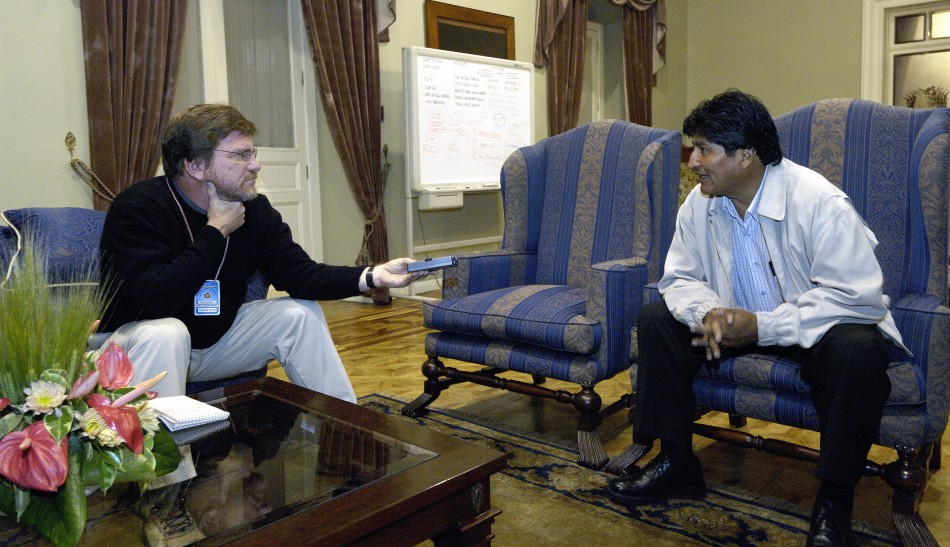Global Lens Reflections on life, the universe, and everything
Morales’ morning
Most of the time I interview people who are powerless: victims of oppression, refugees and street children, sex workers and migrants. I do that intentionally, as their perspective is usually given short shrift in much of the media. Too many officials and wealthy people get quoted. But every once in a while I seek out someone relatively high up to talk with, and over the years I’ve got to talk with religious and political leaders ranging from Pat Robertson and Jimmy Swagart to Yasser Arafat and Fidel Castro. Yet one of the more fascinating political leaders I’ve had the pleasure of interviewing is Evo Morales, the first indigenous president of Bolivia. That interview was also one of the shortest.
In 2006, I was in Bolivia to, along with some other stories, research an article about Casimira Rodriguez, a former domestic worker who Morales had appointed the country’s minister of justice. I interviewed her and followed her around for a couple of days, and I also wanted to interview her boss, the president. I had seen him in a couple of public events, such as the one above where he’s having lunch with a bunch of students while wearing a necklace of coca leaves and drinking Coca-Cola. His wit and wisdom were always evident. He seemed like a genuinely nice guy. I pestered his press secretary for a few days, and finally got a call that I should be at the presidential palace at 4 am the following morning. Morales hadn’t been in office long, but was already famous for his workaholic behavior, and usually came to the office at 5 am. So the next morning I went to the palace with Dakin Cook, a fellow United Methodist missionary who lived in La Paz at the time. We showed up, me panting in the oxygen-challenged atmosphere, were checked off a list, and told to wait. Other petitioners of various sorts also arrived. We waited. And waited. Five am came and went. Word leaked out that the president had had a late night and would be a bit later than normal. Finally, a little past 6 am, we were ushered into a room inside the palace and told to wait. A few minutes later President Morales came in and we sat down to talk.
I had a list of questions prepared, a relatively short list because I expected the president to be as loquacious in private as I had experienced him in public. But instead he was solemn, taciturn, and although he was gracious and answered directly the questions I asked him, including some hard questions about relations between the government and some Catholic bishops, he didn’t expound much. He seemed grumpy. I was frustrated. After only about ten or 12 minutes, I thanked him for his time and he left.
Dakin and I were shown out and went to have breakfast. While we were eating, I got a phone call on my cell from GeorgeAnn Potter, a friend who is a senior research fellow at the Council on Hemispheric Affairs. She lived in Bolivia at the time but had been out of the country, and was returning my call after getting my voice message. She asked what I was up to, and I said I had just had an interview with President Morales. She was quiet for a moment and then said, “Just now? You mean this morning?” I replied affirmatively. “Uh oh,” she said. “Was he in a bad mood?” I laughed, and she went on to explain to me that he was famous for being grumpy in the morning, and that “experienced journalists” refused to accept the early morning interview slots they were offered, preferring to wait until later in the day when he’s had his Coca-Cola and lightened up a bit.
D’uh.

Photo by Dakin Cook.
